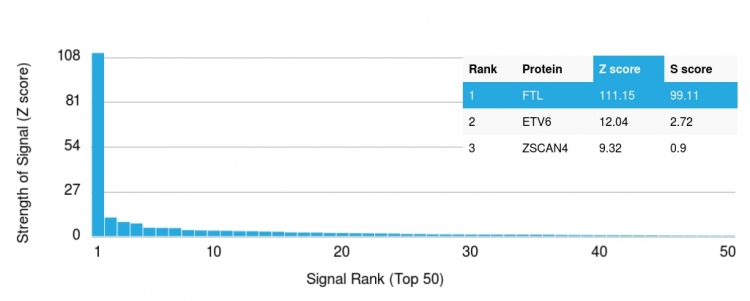
Analysis of Protein Array containing more than 19,000 full-length human proteins using Ferritin, Light Chain Mouse Monoclonal Antibody (FTL/1389). Z- and S- Score: The Z-score represents the strength of a signal that a monoclonal antibody produces when binding to a particular protein on the HuProtTM array. Z-scores are described in units of standard deviations (SDs) above the mean value of all signals generated on that array. If targets on HuProtTM are arranged in descending order of the Z-score, the S-score is the difference (also in units of SDs) between the Z-score. S-score therefore represents the relative target specificity of a Monoclonal Antibody to its intended target. A Monoclonal Antibody is considered to specific to its intended target if the Monoclonal Antibody has an S-score of at least 2.5. For example, if a Monoclonal Antibody binds to protein X with a Z-score of 43 and to protein Y with a Z-score of 14, then the S-score for the binding of that Monoclonal Antibody to protein X is equal to 29.
Ferritin Light Chain antibody [FTL/1389]

GTX34724
ApplicationsWestern Blot, ELISA, Other Application
Product group Antibodies
ReactivityHuman
TargetFTL
Overview
- SupplierGeneTex
- Product NameFerritin Light Chain antibody [FTL/1389]
- Delivery Days Customer9
- ApplicationsWestern Blot, ELISA, Other Application
- CertificationResearch Use Only
- ClonalityMonoclonal
- Clone IDFTL/1389
- Concentration0.2 mg/ml
- ConjugateUnconjugated
- Gene ID2512
- Target nameFTL
- Target descriptionferritin light chain
- Target synonymsepididymis secretory sperm binding protein; ferritin L subunit; ferritin L-chain; ferritin light chain; ferritin light polypeptide-like 3; ferritin, light polypeptide; LFTD; NBIA3
- HostMouse
- IsotypeIgG1
- Scientific DescriptionThis gene encodes the light subunit of the ferritin protein. Ferritin is the major intracellular iron storage protein in prokaryotes and eukaryotes. It is composed of 24 subunits of the heavy and light ferritin chains. Variation in ferritin subunit composition may affect the rates of iron uptake and release in different tissues. A major function of ferritin is the storage of iron in a soluble and nontoxic state. Defects in this light chain ferritin gene are associated with several neurodegenerative diseases and hyperferritinemia-cataract syndrome. This gene has multiple pseudogenes. [provided by RefSeq, Jul 2008]
- ReactivityHuman
- Storage Instruction2°C to 8°C,-20°C or -80°C
- UNSPSC12352203

![WB analysis of HeLa cell lysate using GTX34724 Ferritin Light Chain antibody [FTL/1389]. WB analysis of HeLa cell lysate using GTX34724 Ferritin Light Chain antibody [FTL/1389].](https://www.genetex.com/upload/website/prouct_img/normal/GTX34724/GTX34724_20200115_WB_147_w_23060801_828.webp)